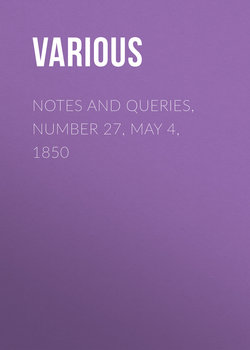Читать книгу Notes and Queries, Number 27, May 4, 1850 - Various - Страница 7
THE ANGLO-SAXON WORD "UNLAED."
ОглавлениеA long etymological disquisition may seem a trifling matter; but what a clear insight into historic truth, into the manners, the customs, and the possessions of people of former ages, is sometimes obtained by the accurate definition of even a single word. A pertinent instance will be found in the true etymon of Brytenwealda, given by Mr. Kemble in his chapter "On the Growth of the kingly Power." (Saxons in Engl. B. II. c. 1.) Upon this consideration I must rest for this somewhat lengthy investigation.
The word UNLAED, as far as we at present know, occurs only five times in Anglo-Saxon; three of which are in the legend of Andreas in the Vercelli MS., which legend was first printed, under the auspices of the Record Commission, by Mr. Thorpe; but the Report to which the poetry of the Vercelli MS. was attached has, for reasons with which I am unacquainted, never been made public. In 1840, James Grimm, "feeling (as Mr. Kemble says) that this was a wrong done to the world of letters at large," published it at Cassell, together with the Legend of Elene, or the Finding of the Cross, with an Introduction and very copious notes. In 1844, it was printed for the Aelfric Society by Mr. Kemble, accompanied by a translation, in which the passages are thus given.—
"Such was the people's
peaceless token,
the suffering of the wretched."
l. 57-9.
"When they of savage spirits
believed in the might,"
l. 283-4.
"Ye are rude,
of poor thoughts."
The fifth instance of the occurrence of the word is in a passage cited by Wanley, Catal. p. 134., from a homily occurring in a MS. in Corpus Christi College, s. 14.:—
"Men ða leoçes can hep re3þ se hal3a se[~s] Io[~hs] þaep re Hael. eode ofen þone bupnan the Ledpoc hatte, on in[=e]n aenne p[.y]ptun. Tha piste se unlaesde iudas se þe hune to deaþe beleaped haefde."
In Grimm's Elucidations to Andreas he thus notices it:—
"Unlaed, miser, improbus, infelix. (A. 142. 744. Judith, 134, 43.). A rare adjective never occurring in Beowulf, Coedmon, or the Cod. Exon., and belonging to those which only appear in conjunction with un. Thus, also, the Goth. unleds, pauper, miser; and the O.H.G. unlât (Graff, 2. 166.); we nowhere find a lêds, laed, lât, as an antithesis. It must have signified dives, felix; and its root is wholly obscure."
In all the Anglo-Saxon examples of unlaed, the sense appears to be wretched, miserable; in the Gothic it is uniformly poor1: but poverty and wretchedness are nearly allied. Lêd, or laed, would evidently therefore signify rich, and by inference happy. Now we have abundant examples of the use of the word ledes in old English; not only for people, but for riches, goods, movable property. Lond and lede, or ledes, or lith, frequently occur unequivocally in this latter sense, thus:—
"He was the first of Inglond that gaf God his tithe
Of isshue of bestes, of londes, or of lithe."
P. Plouhm.
"I bed hem bothe lond and lede,
To have his douhter in worthlie wede,
And spouse here with my ring."
K. of Tars, 124.
"For to have lond or lede,
Or other riches, so God me spede!
Yt ys to muche for me."
Sir Cleges, 409.
"Who schall us now geve londes or lythe,
Hawkys, or houndes, or stedys stithe,
As he was wont to do."
Le B. Florence of Rome, 841.
"No asked he lond or lithe,
Bot that maiden bright."
Sir Tristrem, xlviii.
In "William and the Werwolf" the cowherd and his wife resolve to leave William
"Al here godis
Londes and ludes as ether after her lif dawes."
p. 4
In this poem, ludes and ledes are used indiscriminately, but most frequently in the sense of men, people. Sir Frederick Madden has shown, from the equivalent words in the French original of Robert of Brunne, "that he always uses the word in the meaning of possessions, whether consisting of tenements, rents, fees, &c.;" in short, wealth.
If, therefore, the word has this sense in old English, we might expect to find it in Anglo-Saxon, and I think it is quite clear that we have it at least in one instance. In the Ancient Laws and Institutes of England, vol. i. p. 184., an oath is given, in which the following passage occurs:
"Do spa to lane
beo þé he þinum
I leat me be minum
ne 3ypne le þines
ne laedes ne landes
ne sac ne socne
ne þu mines ne þeapst
ne mint ic þe nan þio3."
Mr. Thorpe has not translated the word, nor is it noticed in his Glossary; but I think there can be no doubt that it should be rendered by goods
1
It occurs many times in the Moeso-Gothic version of the Gospels for [Greek: ptochos]. From the Glossaries, it appears that iungalauths is used three times for [Greek: neaniskos], a young man; therefore lauths or lauds would signify simply man; and the plural, laudeis, would be people. See this established by the analogy of vairths, or O.H.G. virahi, also signifying people. Grimm's Deutsche Gram. iii. 472., note. "Es konnte zwar unlêds (pauper) aber auch unlêths heissen."—D. Gr. 225.
